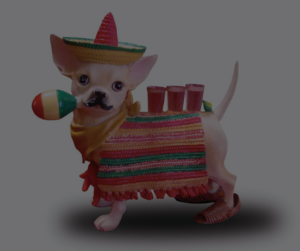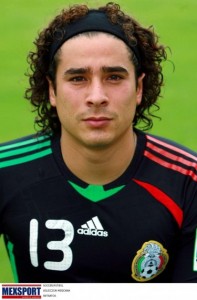
June 22, 2014 – And goalkeeper Guillermo Ochoa is the World Cup’s new “football” darling as Brazil could not find a way past Mexico’s inspired goalkeeper when they met in Fortaleza, although curiously enough he is currently without a club. Ochoa kept a clean sheet in Mexico’s opening match, their 1-0 defeat of Cameroon last Friday, but he didn’t face a shot on target until the 90th minute. Things were not so simple against Brazil, who tested him on seven occasions. These were not run-of-the-mill, straight-down-the-middle daisy cutters; Brazil pummelled Ochoa’s goal, making him stretch one way and then the other to repel headers, volleys and a general bombardment of traffic towards his net. The Brazil striker Fred said Ochoa had performed “four miracles”, which might have been stretching things a little, but the man himself was no less excited: “It was the game of my life.”
Francisco Guillermo Ochoa Magaña (born 13 July 1985) is a Mexican goalkeeper who plays for the Mexico national team. He is currently a free agent, having last played for Ajaccio. Ochoa made his debut for América in 2004 in a league match against Monterrey. He won his first league title in 2005 and was the club’s first-choice goalkeeper up until 2011, making over 200 appearances for América. That summer Ochoa was transferred to Ajaccio in France. He spent three seasons with the club until their relegation from Ligue 1 in 2014. A Mexican international since 2005, Ochoa received his first cap during a friendly match against Hungary, which Mexico won 2–0. Ochoa has been included in the 2006 and 2010 World Cup squads, though never appearing in either tournaments, the 2007, 2009, and 2011 CONCACAF Gold Cups, with Mexico winning the 2009 edition and Ochoa being the starting goalkeeper.
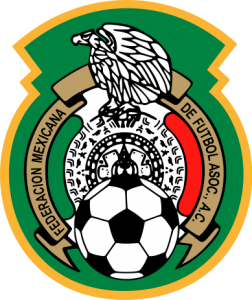
Did you know?
The Mexico national football team (Spanish: Selección de fútbol de México) represents Mexico in association football and is governed by the Mexican Federation of Association Football (FMF), the governing body for football in Mexico. Mexico’s home stadium is the Estadio Azteca and their head coach is Miguel Herrera. The team is currently ranked 20th in the FIFA World Rankings and 16th in the World Football Elo Ratings. Mexico has qualified to fifteen (15) World Cups and has qualified consecutively since 1994, making it one of only six (6) countries to do so. The Mexican national team, along with Brazil and Germany, are the only nations to make it out of the group stage over the last five World Cups. Mexico played France in the very first match of the first World Cup on 13 July 1930. Mexico’s best progression was reaching the quarter-finals in both the 1970 and 1986 World Cups, both of which were staged on Mexican soil.
Mexico is historically the most successful national team in the CONCACAF region, as they are the only team from the region to win an official FIFA recognized title. They hold one FIFA Confederations Cup, nine CONCACAF championships, including six CONCACAF Gold Cups, one North American Nations Cup and three NAFC Championships. Mexico is one of only seven nations to have won at least two out of the three most prestigious international football tournaments (FIFA World Cup, FIFA Confederations Cup, Summer Olympics), winning the 1999 FIFA Confederations Cup and the Gold Medal at the 2012 Summer Olympics. Although Mexico is under the jurisdiction of CONCACAF, the national football team has been regularly invited to compete in the Copa América since 1993 finishing as runner-up twice and obtaining the third place medal on three occasions.
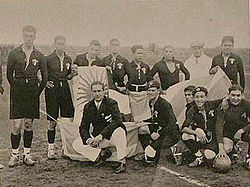
Football in Mexico was first organized in the early 20th century by European immigrant groups, notably miners from Cornwall, England, and in later years Spanish exiles fleeing the Spanish Civil War. Their very first match was played against Guatemala, which the Mexican team won 3–2. A series of international friendlies were played against the national representation of Guatemala on December 9, 12, and 16 of 1923. The match on December 9 was played in Parque España and was won by Mexico with a final score of 2–1. On December 12, the match ended in a 2–0 win for Mexico, and the final game of the series ended in a 3–3 draw. The manager for this team was Rafael Garza Gutiérrez, and the assistant coach was Adolfo Frías. The fourteen players selected for this friendly series include: Nacho de la Garza, Pedro “Perico” Legorreta, Manuel “Güero” Yáñez, Enrique “La Matona” Esquivel, Agustín Ojeda, Roberto Jardón, Carlos Garcés, Horacio Ortiz, Adeodato López, Mauro Guadarrama “La Venada” Alatorre, Cornelio Cuevas, and Alfredo García Besné.
In 1970, Mexico hosted the World Cup and kicked off their campaign with a scoreless draw against the Soviet Union. This was followed by a win over El Salvador (4–0). Mexico advanced to the next round with a victory against Belgium thanks to a penalty scored by Gustavo Peña in the 14th minute. At the quarter-finals stage, Mexico was eliminated by Italy in a 4–1 match despite Mexico taking an early lead.
1986, Mexico again hosted the World Cup. Coached by Bora Milutinović, Mexico was placed in Group B where they defeated Belgium 2–1, draw 1–1 with Paraguay, and defeated Iraq 1–0. With this performance, Mexico won the top spot in its group and advanced to the next round where they faced Bulgaria in a 2–0 win. In the quarter-finals stage, Mexico lost to West Germany 1–4 in a penalty shootout after the match finished 0–0.
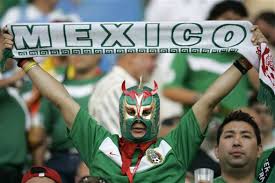
Road to Brazil 2014
The 2011 CONCACAF Gold Cup saw Mexico placed in Group A along with Costa Rica, El Salvador and Cuba. After the 5–0 win against Cuba, it was reported that five Mexican players tested positive for the banned substance clenbuterol: Guillermo Ochoa, Francisco Javier Rodríguez, Antônio Naelson, Édgar Dueñas, and Christian Bermúdez. Mexico won the group with three wins and no losses and scored 14 goals, and were scored on only once. They beat Guatemala in the quarter-finals 2–1, and beat Honduras in extra-time 2–0. For the third-straight year, the final was against the United States. After trailing 0–2, Mexico came back and scored four goals to win the match 4–2, thus being crowned champions, and earning a spot in the 2013 FIFA Confederations Cup in Brazil, where they were eliminated at the group stage. On 28 June 2011, eight players from the Under-22 squad that was to participate in the 2011 Copa América in Argentina were expelled from the squad after it was discovered the players had brought prostitutes to the hotel the team was staying at in Quito, Ecuador (OOPS!).
In 2012, Mexico won a gold medal at the 2012 Olympic Games, defeating Brazil 2–1 at Wembley Stadium. Mexico went 2–1 in the group stages of the 2013 CONCACAF Gold Cup, defeating Canada and Martinique but losing to Panama. Mexico then defeated Trinidad and Tobago 1–0 in the quarter-final match, before facing Panama again in the semi-final. Mexico lost the semi-final match, 2-1, in front of the largest crowd to ever watch a Gold Cup semi-final match held in the United States (over 81,000 were in attendance). The two losses to Panama were the first two times Panama had ever defeated Mexico in a Gold Cup match. Mexico won only two of ten matches during the fourth round of 2014 World Cup qualifying, but qualified for an intercontinental play-off as the fourth-highest placed team in the CONCACAF region after the United States defeated Panama in the final round of matches. They defeated New Zealand 9–3 on aggregate to qualify for a sixth consecutive World Cup.
Mexico takes on Croatia tomorrow. Mexico may need some scoring punch when they face Croatia. Though El Tri will advance with a draw, Mexico may not have much choice to also attack, considering Croatia’s aggressive midfield. Mexico may need more production from midfielders Andres Guardado, and Hector Herrera, who was responsible for some excellent passes against Cameroon. The catalyst off the bench for Mexico is Javier “Chicharito” Hernandez. The Manchester United forward has not played a vital role thus far, but he is capable of being a difference maker. It will be interesting to see if head coach Miguel Herrera decides to shake up his tactics and perhaps give Chicharito more playing time.
Good Luck Mexico!

